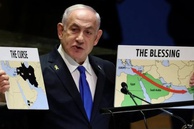US President Donald Trump has called on Israel to refrain from any actions that might disrupt his administration's efforts to resolve the situation around the nuclear deal with Iran. Trump said that it was not a warning, adding, however, that “this would be inappropriate to do right now,” that US and Iranian officials have been discussing the matter. What's going on between the two closest allies?
During Donald Trump's recent tour of the Middle East, Israel was conspicuously absent from his itinerary. Is this a sign of a cooling between the two historically very close allies?
When Trump visited the Middle East in mid-May, he only briefly mentioned the Jewish state. While in Saudi Arabia, he gave a lengthy speech where, among other things, he made it clear that he was prioritizing the policy of the previous two US administrations, including his own first term in the White House, to convince Riyadh to sign the Abraham Accords and move toward formal normalization of relations with Israel. "You will do it in due time," Trump said, acknowledging the Saudi position, which refuses to normalize ties with Israel while the war in Gaza continues.
Israel's absence from Trump's schedule was another in a series of events that have caused serious concern in Tel Aviv. Trump's diplomatic overtures to Riyadh and Iran, the US deal with the Houthis and a personal meeting with Syria’s interim President Ahmed Al-Sharaa, whom Israel does not trust. The Times of Israel wrote about the Jewish State’s "marginalization" in Trump's Middle East policy. However, as evident from the recent events, Netanyahu has no means to influence Washington’s policy. Any direct confrontation with Trump would cause an immediately backlash at home from his pro-Trump electorate.
That being said, in March, Trump still allowed Benjamin Netanyahu to de facto break the ceasefire and resume Israel's war in Gaza after the Israeli Premier and his staff managed to convince the White House of the Jewish state's ability to finally defeat Hamas within the next few months. Trump also shared Tel Aviv’s view that the new Syrian leadership was unreliable. However, during his visit to the White House in early April, Netanyahu was stunned by Trump’s stated intention to negotiate with Iran on its nuclear program. Now the US president may be on the way to signing a deal with Tehran in which Israel has no say. At the same time, during his recent visit to the Middle East, Trump denounced interventionism, saying that the people of Gaza “deserve a much better future.”
This contrasts with Trump’s first term when he was foursquare behind Israel. He pulled out of the nuclear deal with Iran, tightened sanctions against Tehran, and ramped up military pressure on the Islamic Republic, culminating in the assassination of General Qasem Soleimani. Trump also moved the US embassy in Israel to Jerusalem, and the Abraham Accords prepared by his administration, among other things, shed light on the budding cooperation between several Arab countries and Israel against Iran.
However, with the start of Trump’s second term, his public policy towards Israel very contradictory, to say the least. On the one hand, his Secretary of State Marco Rubio, recently fired National Security Advisor Mike Waltz and the US Ambassador to Israel Mike Huckabee – both advocates of unconditional support for Israel. Meanwhile, Trump himself and members of his administration refrain from openly criticizing the Netanyahu government. Finally, the White House keeps selling weapons to Tel Aviv for use in Gaza and has done little to pressure the Israelis over the humanitarian situation in the Strip. That said, even before he took office, Trump started putting pressure on Tel Aviv and, according to Western media, played a decisive role in forcing Israel to sign a truce with Hamas. The main sticking point between Trump and Netanyahu now is Iran. The White House has so far refrained from exerting maximum pressure on Tehran and has intensified negotiations with it. Resulting from the changes that have recently occurred in the region, the Gulf states are also trying to maintain détente with Iran, which, in turn, is signaling its readiness to clinch a deal with the United States to avoid war.
The release of Edan Alexander, the Israel soldier and a US citizen, who had been held in Gaza for 19 months, came as yet another diplomatic setback for Netanyahu. First, acting against Israel’s express wishes, Trump’s personal representatives negotiated with Hamas. Then, adding insult to injury, they did not inform the Israelis about of the progress of those talks. This has led to speculation about Trump intending to force Netanyahu to end the blockade of Gaza and agree to a long-term ceasefire. However, Netanyahu is trying to stick to his guns. On May 18, the Israelis launched a new large-scale operation in Gaza, officially to ensure the “complete defeat” of Hamas. On May 22, Netanyahu recalled his team negotiating with Hamas in Qatar, explaining the move by the radical Palestinian movement’s categorical demand that any agreement include a cessation of hostilities, backed by guarantees from the US. Israeli media sources say that the talks “have reached an impasse." On May 26, Reuters reported that Hamas had agreed to the US-proposed ceasefire, but Israel had "unofficially rejected it." According to The Jerusalem Post, the White House is urging Netanyahu to put on hold a major attack on the Gaza Strip "in order to complete negotiations on the release of Israeli hostages and to let negotiations continue in parallel with military action." The other Western countries are also ramping up pressure on the Jewish State, with the British Prime Minister, the French President, and the Canadian Prime Minister condemning on May 20 the new Israeli military operation in Gaza. Most EU members, which are Israel’s main trading partners, are mulling a revision of their free trade agreement with it. France has even indicated that it is ready to recognize a Palestinian state.
Meanwhile, last Sunday, Tehran representatives described the results of the fifth round of negotiations with the US as "difficult." According to the Omani Foreign Minister, "some, but not final progress" has been achieved in the negotiations. According to information “leaked” to the Western and Middle Eastern media, the failure of the US-Iranian negotiations or a new nuclear deal not removing Israel's concerns about Iran developing nuclear weapons by enriching uranium could force Israel to strike the Islamic Republic "even without Washington's consent." Well, Trump himself has threatened to hit out at Iran if the negotiations fail.
On May 20, Iran's Supreme Leader Ayatollah Ali Khamenei said that US demands for Tehran to stop reprocessing uranium are "excessive and outrageous" and expressed doubt that negotiations on a new nuclear deal would be successful. After US media reported, citing sources in the US intelligence community, about Israel preparing to attack Iran's nuclear facilities, the Iranian military warned that Israel would receive a "devastating and decisive response" if it attacked Iran. The Iranian Foreign Ministry, for its part, said it would hold the US responsible for any Israeli attack on its nuclear facilities.
Whether Netanyahu has already decided to strike or not is anyone’s guess though, as this could be just another attempt to put pressure on Tehran. On May 26, Iranian Foreign Ministry spokesperson Esmail Baghaei reiterated that his country “will not temporarily suspend uranium enrichment in order to conclude a nuclear deal with the United States.” That same day, Israel’s Channel 12 reported that Netanyahu and Trump had a “tense phone call” last week marked by sharp disagreements over how to confront Iran. [i] If Tehran shows it is willing to negotiate, Netanyahu could be faced with an unpleasant choice: defy the White House and act unilaterally, or back down and accept a new nuclear deal that might limit the scope of Iran’s nuclear program, but not as much as Tel Aviv would like.
When the Biden administration threatened to cut military assistance to Israel amid reports of mass-scale deaths among the Arab population of Gaza, Netanyahu said that this would not stop him and, if necessary, Israel would fight “tooth and nail.” Trump is not Biden, however, and has no fear of “rhetorical and political landmines” in American politics that traditionally arise when it comes to the US support for Israel. A down-to earth realist, Trump does not seem to care much about the intricacies of political issues. He is simply looking for the best deal for Washington. Trump does not mind what Israel is doing in Gaza, and he has made it clear that he will not pressure Israel to end the war, especially now that the last hostages - US citizens - are free. At the same time, he may well abandon the role of “ally” if it contributes to the success of his beloved “deal-making” approach.
Over the past decades, American leaders have lost much of their ability to let the Israeli government know when it has gone too far. Trump, however, has made clear that this approach is not always compatible with putting American interests first. [ii] It looks like Trump has other priorities now as he is negotiating large-scale arms deals and even civilian nuclear energy with Gulf allies. This may indicate that his new administration is prioritizing investment over security and is moving away from traditional allies.
On the other hand, the current rift with Israel, if what is happening between the two countries is not just for show, can also be the result of Trump’s now-famous impulsiveness. His visit to the Gulf states looks like an attempt to reset America’s Middle East policy. The question is, however, whether the current US leader will hold the course and follow through. Trump may not pressure Israel on Iran, Gaza, settlements or anything else, but he is quite willing to sign deals without Israel, and Tel Aviv will have to deal with the consequences on its own. However, Trump may quickly lose faith in the prospects of negotiations with Tehran. If so, he will not only greenlight an Israeli strike, but may also order the US military to join in.
In summation, even though chances are that President Trump will favor signing not only commercial but also geopolitical deals, he might as well be prepared to wash his hands of it, if it does not promise quick results. Time will tell whether Israel will be able to adapt to the new trends in the White House, or will have to take its time and wait for the next change of power in Washington.
The views of the author are his own and may differ from the position of the Editorial Board.
[i] https://www.timesofisrael.com/report-netanyahu-trump-phone-call-on-iran-was-marked-by-heated-disagreements/
[ii] https://foreignpolicy.com/2025/05/14/trump-israel-president-netanyahu-different
read more in our Telegram-channel https://t.me/The_International_Affairs

 12:34 30.05.2025 •
12:34 30.05.2025 •



























